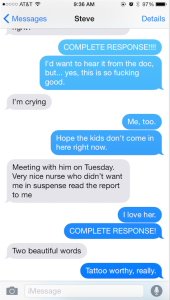Does everyone spend a portion of the night awake in bed replaying all embarrassing moments? It can’t be just me. Anyone else have a Humiliation Hall of Fame that plays as a closed loop of highly edited memories when the room goes dark? Here are some gems from my highlight reel:
My crush and his ex-girlfriend rekindling their romance right after I delivered that flirty note.
Referring to my research project as “sexy” to the unamused Harvard interviewer.
Ignoring all signs that the elderly man was more randy than charming and awkwardly escaping his open-mouthed, grabby advances with backpedaling apologies for being married.
Debuting my spot on seagull imitation to partygoers who were more accustomed to girls with cherry stem tongue knot or leg-behind-ear talents. (Never was invited back to that frat house.)
These memories flood many a pre-REM moment. Sometimes the recollection of past blunders is so vivid that I actually recoil and conk Bernie in the head or loose a shiver of mortified regret that makes him fear there’s a spider in the bed. I hope we were all too drunk to remember me nicknaming that surgeon Asshole Khaki Pants. Maybe it wasn’t that awful when my charming repartee prompted, “I have a girlfriend.” Are all of you occasionally (if not as frequently) ridiculous as I am?
I hope so. Sharing the errant gaffe is the good stuff of late night cocktail parties. And those with consistently impeccable manners and good judgment are laudable, but rarely the ones to whisper with you in dark corners. And I’m a whisper in dark corners kind of girl.
Recently I learned there’s an extra level to the heights of humiliation I can reach because my husband is a plastic surgeon. Just as interior designers have gorgeous furnishings and computer scientists wield the latest iThings, plastic surgeons have injectables. And plastic surgeons like Bernie have a prop patient for poisons and lasers. I promised to love, cherish, and submit to wrinkle-zapping and fat-freezing till death do us part. Apparently.
Having your own, personal (and lovely, talented, and generally awesome) aesthetic guru shouldn’t be anything short of delightful. But I can make even simple forehead smoothing ridiculous. Here’s some handy advice: don’t go swimming after Botox. At the very least, maybe don’t squeeze goggles around your toxin-filled eye sockets and expect fantastic results. Luckily, only one lid drooped… and only for a week or so… and I’m sure no one thought my travel mug was brimming with vodka or anything. I may have appeared concussive, but I looked young, dammit.
Recently, I killed at Garden Club, winning first prize for my dahlias for the third year running. And I don’t even lift my tubers. This should have been a totally not embarrassing day. I arrived early to help other garden clubbers match genera and species to their cuttings. I chatted up other flower fanatics over buttery baked goods and coffee. I wore the girliest of dresses and it was all lovely lovely lovely. Skipping around in my cashmere ruana oohing and ahhing over foliage and photos and fall arrangements, I had completely forgotten that Bernie had attacked my lower lids with the handheld laser the night before.
To be clear, Bernie doesn’t zap me because I’m not already stunning (duh), but because the new laser is a fun new gadget. And boys must test fun new gadgets! There’s something about being a Mom that makes one forget to look really closely in the mirror. With just a smidgen of attention and a bit of concealer, I could have avoided attending Garden Club looking like an Athletic Warrior for the Cure wearing pink-hued eye-black. Until Bernie suggested I don sunglasses, I had spent an entire morning twirling around town Ridiculously Unaware. (The garden clubbers were too polite to inquire about my crosshatched half moons of sunburn.) Friends who are as vain as I am swear they would love to have live-in staff willing to zap away the years. Maybe they’d be smart enough to forgo the goggles or attack crow’s feet on the weekends.
I’m not.
The best beauty treatment probably isn’t found in a syringe or de-wrinkling light saber, at all– but in a long and restful night of sleep. And I plan to implement this regimen. Real quick. Right after I relive decades of ill-timed waterfowl impressions and other embarrassments. Sleep well, my pretties.



